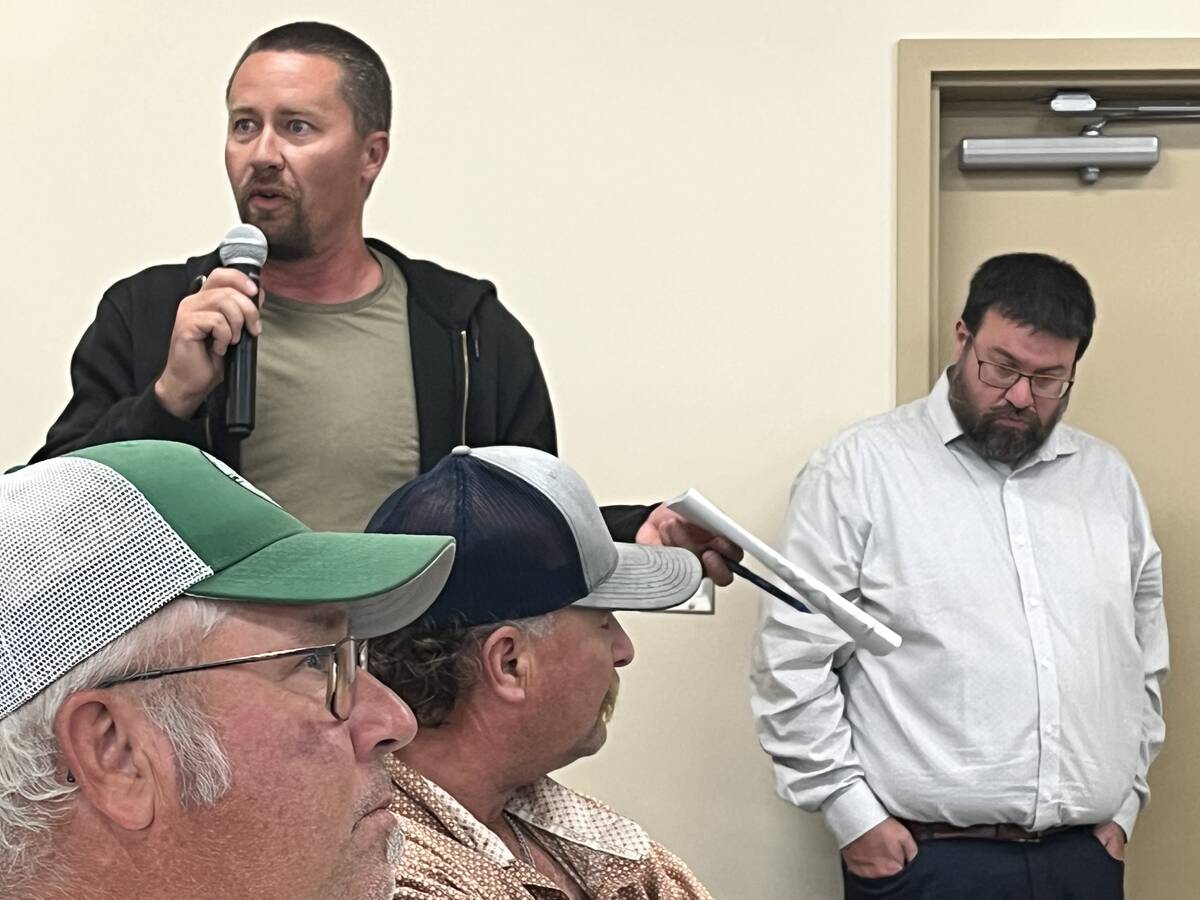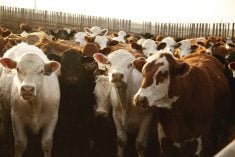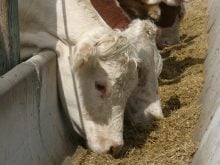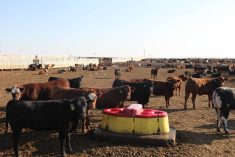The cost of grazing leases continues to be contentious in southern Alberta.
An information session held by the Municipal District of Taber earlier this month to discuss grazing lease policy filled the room with producers, many of whom warned the proposed changes threaten to end their way of life.
Cultivated leases will be tendered upon their expiration in 2026, with the right of first refusal for current lease holders for the first five years. After that, it will be an open tender system.
Grazing leases will be grouped into legacy leases for immediate family and tendered five-year terms, which are the lands that were returned to the MD and put out to tender.
Read Also

Charges laid after cattle theft
Saskatchewan RCMP lay two charges against a man after six cattle went missing.
Rent will increase from 70 cents per acre to $5.71 per acre, or $26.10 per animal unit month, with market rates examined in year five and year eight of the 10-year legacy lease term, and an option of another 10 years.
Under the new terms, there will be no option to market lease rights under both types of grazing leases. Proposals also include the leaseholder receiving none of the compensation for oil and gas infrastructure.
All leases will have an MD and tenant option to trigger the sale of the land, with the municipal council making the final decision.
As well, there will be no right to first refusal, which distressed many producers in the room.
“What problem are you trying to solve? All I see is this is a big cash grab for the MD. It’s not fair, it’s not right,” said Jim Bettcher of Bettcher Farms/Crystal Creek Cattle.
“We are going into a third-generation farm, and I want to give my son (Jaden) every benefit to go farming. He can do anything else he wants; he chose to come farming, and you’re making it tougher and tougher and tougher for him to start up his own operation. Maybe you have to look at cutting other things instead of generating cash.”
Farmers in the packed room at the district’s operations facility said they are concerned the proposed changes to leases will make for Hatfield and McCoy scenarios, pitting neighbour against neighbour in bidding wars.
There is also the spectre of pushing out multi-generational families who have stewarded the land over the decades, in favour of special-interest institutions or individuals with deep pockets with no incentive of taking care of the land.
There are provisions in the proposed policy to facilitate a land sale with a year’s notice, or to grant a lease to a third party for an alternative use with 30-days written notice.
After audience inquiries, it was confirmed by administration there have been exploratory talks with Bow River Irrigation District to break up numerous quarters of land in question for development.
David Bekkering of TFS Expanse and Feedlots brought up a scenario in which the first right of refusal terms, if not clarified, could lead the MD into some legal exposure. He said he could act as an MD leaseholder, purchase all the land under a bid process and then re-sell it to a fund.
“I think there is short-sightedness taken in your purchase policy, and I think you guys will be attacked legally on a few sides of it. It needs to be reviewed,” said Bekkering.
He talked of the fairness of appraised value in rental lease rates, citing a legal case currently going on in British Columbia involving the acquisition of huge parcels of ranch land.
“You could have people with trapped parcels, people who turn around and act as a buying group privately, and turn around and sell it.”
Many cattle producers seemed amicable to the increased fixed rent proposal, which would be triple the current 2025 provincial rate, particularly since the MD researched other jurisdictions for price points.
However, some found the land-sale option short sighted, saying it would raise one-time funds rather than being a constant revenue generator for the MD, which is looking to maximize its assets with dwindling oil revenue.
“The MD is getting appraised value for their land and they are not getting in a fight with their neighbours. You are getting the SunLife insurance and the teacher’s funds bidding on the landowners, where some of these landowners have had the land for over 100 years, and you’re kicking them off,” said Roy Brewin of Rowland Farms.
“They can continue leasing at fair market value, and I don’t think you’re being unfair on your (new) prices. I don’t think we expect the land for free. You’re thinking more of the people who have moved in these last few years rather than the operator who has been here for 100 years or 20, 30, 40 years. You’re not thinking about them who have improved the land. They have fenced it, they have taken care of that land.”
A couple of farmers spoke about a select few cornering the grazing lease market over the years. They suggested that even the inflated grazing lease prices of $5.71 per acre for legacy leases should be opened up to lease bid tender when they’re set to expire.
Expiring leases are coming up starting in February 2026 and running through 2027.
“These lands belong to the MD and they belong to the taxpayers. As an individual, if I want to pay $10 an acre, and that’s my choice, it should be honoured. Basically, this revenue is shared that comes from the highest bidder throughout the municipality. The way I see this, it’s subsidizing certain people,” said a speaker at the back of the room.
Kim Davis belongs to a fourth-generation farming family in the Vauxhall area, which predated tax-recovery land back to 1918. She said tax revenue is important, but so is maintaining the land for future generations.
“This is a living organism we are talking about; it’s not (just) money. If we let this in 20 years go to a tender process, what’s going to happen?” she said.
“We are going to have people overgraze it, it’s not going to be the same land ever again. And you will make no money because it will be destroyed. The people who have been on the land for 100 years, what we have done is we have cared for it. We’ve rotationally grazed it, we take care of it, we watch it carefully and we make sure it recovers. Please council, and anyone else who is in the room who is thinking of this from a financial standpoint, just remember what else this is. Council has so many years (council terms), it’s short sighted. We think of this in generations in hundreds of years.”
Chris Siemens, president of the Hays Grazing Association, said he has sat through many of the MD grazing lease consultation meetings, which have dragged on for two years.
He said that other revenue streams exist besides the cultivation and grazing leases, such as re-examining property tax rates for farms relative to acreages.
Siemens said he he runs both a cow-calf operation and a modest irrigated farm.
“A policy that is rooted in maximum revenue being what is foundational, to me that creates maximum chaos. It doesn’t give enough water to the other things that are done to steward these lands,” said Siemens.
“There are economies and there are businesses that have been built up over hundreds of years, that are also trying to create opportunities for the next generation.”
The MD has acquired approximately 75,000 acres of deeded grazing lands over the past several decades, which are leased to 123 livestock producers. Plans are for council to bring the proposed policies and lease drafts back to its Aug. 19 meeting and consider the feedback garnered from the information session.

















